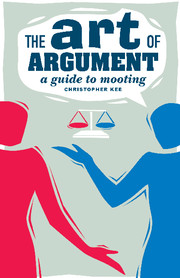Book contents
- Frontmatter
- Contents
- Preface
- Acknowledgments
- Part 1 Making the most of a moot
- 1 Introduction
- 2 You've made the team – what next?
- 3 Being part of a team
- 4 Building an argument
- 5 Written documents
- 6 Oral submissions
- 7 Practice moots
- 8 The competition itself
- 9 After it's all over
- Part 2 References and resources
- Part 3 International moots
- Index
4 - Building an argument
Published online by Cambridge University Press: 05 June 2012
- Frontmatter
- Contents
- Preface
- Acknowledgments
- Part 1 Making the most of a moot
- 1 Introduction
- 2 You've made the team – what next?
- 3 Being part of a team
- 4 Building an argument
- 5 Written documents
- 6 Oral submissions
- 7 Practice moots
- 8 The competition itself
- 9 After it's all over
- Part 2 References and resources
- Part 3 International moots
- Index
Summary
This is one of the most important chapters of this book. The principles outlined here apply not only in the context of the mooting competition, but equally in legal practice. As an advocate in a moot or in professional practice you need to develop and deliver a compelling and convincing argument to support your case.
So how do you build an argument? There are a variety of approaches you might take. The method suggested below is only one option. However, a feature of most successful approaches is a defined structure.
THE BASIC STEPS
Before you start to build an argument, think about how you are going to develop the structure of your argument, and most importantly think about how you are going to test it.
Step 1 - Read the facts and decide instinctively who should win
Whenever you encounter a set of facts, you will instinctively form an opinion of who should win. This is human nature. Your opinion will be influenced by many factors, from the way the problem is presented to the personal experiences that have shaped your beliefs and values. For example, we each have our own notions of what is fair and just, and of what is right and wrong. These are emotive and subjective responses. For most people, their emotive and subjective responses will be the instinctive ones. As an advocate you will need to either exploit or overcome these emotive and subjective responses, depending on which side you are representing.
- Type
- Chapter
- Information
- The Art of ArgumentA Guide to Mooting, pp. 18 - 22Publisher: Cambridge University PressPrint publication year: 2007
- 1
- Cited by



